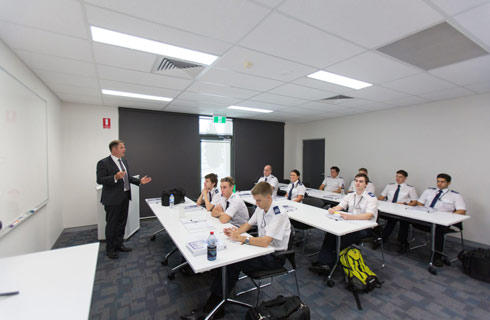地球系统科学(荣誉)学士学位
Bachelor of Science in Earth System Science (Honours)

学历文凭
Bachelor Degree with Honours

专业院系
Department of Atmospheric and Oceanic Sciences

开学时间

课程时长

课程学费

国际学生入学条件
PBT TOEFL -577
Internet-based composite score (iBT) – 90, Minimum component score of 21 in each of reading, writing, listening, and speaking
A band score of 6.5 or better, individual component scores of 6.0 or better.
IDP—雅思考试联合主办方

雅思考试总分
6.5
了解更多
雅思考试指南
- 雅思总分:6.5
- 托福网考总分:90
- 托福笔试总分:577
- 其他语言考试:Pearson Test of English – Academic - Overall score of 65 or better, individual component scores of 60 or better
CRICOS代码:
申请截止日期: 请与IDP顾问联系以获取详细信息。
课程简介
Earth System Science (ESS) concentrates on the linkages between the biological, chemical, physical and human subsystems of the Earth. It focuses on the cycling of energy and matter through the biosphere, the atmosphere, the cryosphere, the hydrosphere and the solid earth, at time scales from days to billions of years. This new, integrated and holistic approach is needed to tackle the complex and challenging global problems facing the Earth today. It draws upon the expertise developed within disciplines such as Ecology, Environment, Geography, Geology, Meteorology and Oceanography. The McGill program in ESS is designed to equip students with the skills and knowledge to address six Grand Challenges that are fundamental to our understanding of the way in which the Earth operates. These are: (1)Global biogeochemical cycles, (2) Climate Variability and Change, (3) Land use and land cover change, (4)Energy and resources, (5) Earth hazards, such as volcanoes, earthquakes and hurricanes, (6) Earth-atmosphere observation, analysis and prediction.<br><br>###COVID Alert Message from University – This course is offered online and will continue on campus later.
相关申请
 预科
预科 奖学金
奖学金 实习机会
实习机会 在校学习
在校学习 跨境学习
跨境学习 校园授课-线上开始
校园授课-线上开始 在线/远程学习
在线/远程学习
学校排名

世界排名44
数据源:泰晤士高等教育世界大学排名
关于麦吉尔大学继续教育学院

麦吉尔大学为一所坐落于魁北克省,加拿大第二大城市蒙特利尔市中心的公立研究型大学。学校成立于1821年英国殖民地时期,是加拿大最古老的高等学府,百年来在国际上享负盛誉。以著名蒙特利尔商人、格拉斯哥大学校友詹姆士·麦吉尔为名,其遗赠为大学成立的基础。麦吉尔后成为美国大学协会中,两所位于美国本土以外的成员之一。麦吉尔大学在加拿大人心中享有崇高地位,长期以来一直位列加拿大大学排行榜榜首,是加拿大排名第一的顶尖研究型大学(又译为医学博士类大学),坐拥着举世闻名的医学院和法学院。大学的本部位于蒙特利尔市中心中皇家山的山脚,另一个附属校园则位于本部以西30公里、布满田野与林地的蒙特利尔岛圣安娜-德-贝尔维尤。麦吉尔众学术单位被归入13所大的学院内。以每名学生的受惠金额来算,校方为其中一所拥有最多捐款回赠的加拿大高校(每位学生21,633加币)。吉尔大学所赋予的学位及文凭涵盖逾300个学术领域,此校的录取分数线及奖学金门槛亦是全国高校之最。在校学生获得的国家级和国际级奖项亦远超其他大学,高居全国第一。麦吉尔大学拥有全国最高的博士生比例和国际生比例,其校友遍布世界180多个国家或地区,是加拿大最国际化的大学。多数学生就读于医学、理学、文学、工程学、管理学五所较大型学院。省内、外及国际生的学费各有参差。麦吉尔大学著名的师生、校友包括了12位诺贝尔奖得主及139位罗德学者,人数均为全国最多。另还有4名加拿大总理、13名加拿大最高法院大法官及众多其他学术奖项的获奖者。麦吉尔校友同时协助了足球、篮球与冰球赛事的发展,及约翰霍普金斯医学院、英属哥伦比亚、维多利亚及艾尔伯塔大学的创立。
本校相关课程

英语水平证书-语言和文化
学历文凭
English Language
开学日期
课程费用总额


社会工作硕士,具有民法学士/法学学士学位
学历文凭
Bachelor Degree
开学日期
课程费用总额


地理哲学博士
学历文凭
Ph.D.
开学日期
课程费用总额


地理科学硕士(论文)
学历文凭
Masters Degree
开学日期
课程费用总额


城市规划硕士(非论文)
学历文凭
Masters Degree
开学日期
课程费用总额


实验外科哲学博士
学历文凭
Ph.D.
开学日期
课程费用总额





















 加拿大
加拿大




